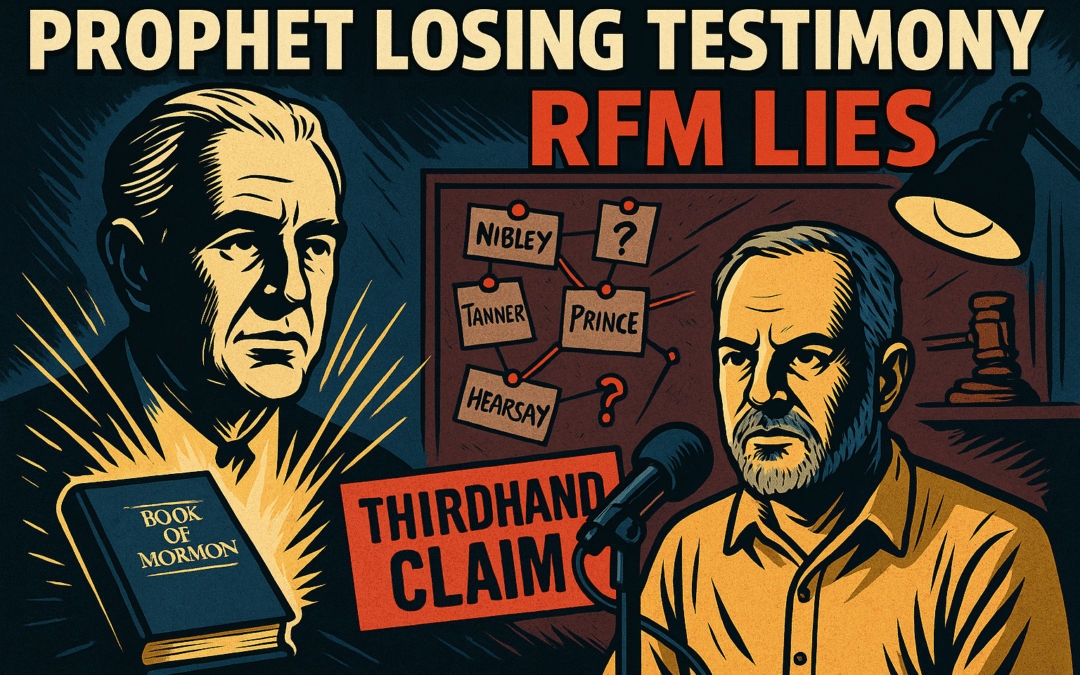Bottom Line
This is theological fiction repackaged as history. McKay’s testimony was firm. Nibley’s writings were firm. The idea that the Book of Mormon was merely authored by Joseph Smith is not supported by any contemporary Church documentation. If it were true, Nibley or McKay’s journals would say so. They do not.
| Podcast | Radio Free Mormon |
|---|---|
| Episode | 409 |
| Category | Book of Mormon Historicity / Leadership Faith |
| Quote | “David McKay told Hugh Nibley that, ‘Well, we already know that Joseph Smith wrote the Book of Mormon.'” — RFM quoting Gregory Prince quoting Hugh Nibley (Gregory Prince Interview, 00:08:00–00:08:35) |
| Core Claim | David O. McKay privately confessed disbelief in the Book of Mormon’s ancient origins to Hugh Nibley. |
| Conclusion | Misleading / Conjectural / Unverifiable |
| Logical Questions |
|
🔍 Core Finding
This quote is a thirdhand hearsay anecdote: Gregory Prince interviewing Hugh Nibley in 1995 about a conversation from the 1960s. The comment was allegedly shared only after Nibley asked Prince to turn off the recorder, then repeated with vague phrasing. There is no documentation in McKay’s journals, First Presidency minutes, or public sermons that supports the idea he rejected the Book of Mormon’s divinity.
Meanwhile, Nibley continued his vigorous public defense of the Book of Mormon throughout the rest of his life—publishing books, teaching at BYU, and never recounting this incident. O.C. Tanner’s influence is exaggerated and conjectural. The idea that McKay reversed lifelong beliefs due to Tanner is narrative embellishment.
📆 Documentary Silence vs. Doctrinal Certainty
- McKay bore testimony of the Book of Mormon repeatedly in Conference and private interviews.
- The claim has no support in firsthand writings or verified audio.
- Nibley’s own writings contradict the idea that he believed McKay denied scripture.
🤖 Statement Against Interest? Or Misremembered?
Podcast host RFM cites legal hearsay exceptions to suggest this is trustworthy. But courts require corroboration. This lacks any. No independent evidence. No diary entry. No tape. And it appears decades after McKay’s death.
📚 Sources
- Joseph Smith Papers: Book of Mormon Translation
- Gospel Topics Essay: Book of Mormon
- FairLatterDaySaints: Hugh Nibley on Book of Mormon
- Gregory A. Prince: David O. McKay and the Rise of Modern Mormonism
- Encyclopedia of Mormonism: David O. McKay
⚠️ Manipulation & Logic Check
- Fallacy: Argument from Silence – Absence of denial is treated as evidence of belief change.
- Fallacy: Guilt by Association – Links McKay to Tanner with no evidence.
- Rhetorical Manipulation: Anecdotal elevation, authority laundering through Prince/Nibley names.
🚨 Defamation & Legal Risk Layer
Although McKay is deceased, the claim borders on “false light” misrepresentation. It assigns beliefs to him contrary to all known public statements. The claim lacks due diligence and presents potential reckless disregard for factual accuracy.

